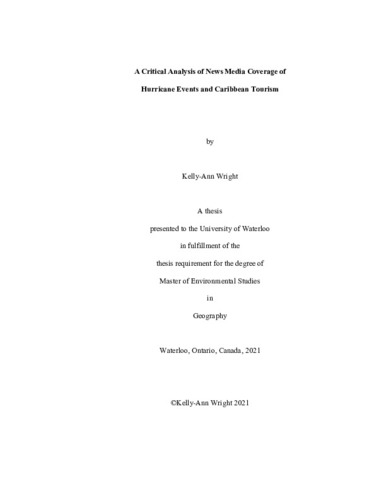| dc.contributor.author | Wright, Kelly-Ann | |
| dc.date.accessioned | 2021-06-02 15:58:49 (GMT) | |
| dc.date.available | 2021-06-02 15:58:49 (GMT) | |
| dc.date.issued | 2021-06-02 | |
| dc.date.submitted | 2021-05-31 | |
| dc.identifier.uri | http://hdl.handle.net/10012/17078 | |
| dc.description.abstract | There is mounting evidence that the media is able to shape public risk perceptions of extreme weather events, which includes influencing tourists’ willingness to travel to destinations impacted (directly or indirectly) by hurricanes. In the aftermath of the 2017 hurricane season, the Caribbean region saw a sharp downturn in tourist arrivals, even on island destinations that did not experience a hurricane strike. The Caribbean Tourism Organization [CTO] and Caribbean governments have expressed concerns that media representation of the Caribbean region as largely devastated by hurricane events, may have negatively affected both the image of the entire region, as well as individual island nations. As one of the most tourism intensive regions in the world, how hurricanes are framed within the media is particularly important for the Caribbean and the millions of people who rely on the sector for their livelihood. Through a mixed methods content analysis of 635 newspaper articles and transcripts published over the last 40 years (1979 - 2019), this thesis explores global news media attribute agenda setting and framing of hurricane events and Caribbean tourism. This study found that, in the last four decades, the global news media has overwhelmingly emphasized negative outcomes for tourism infrastructure, tourists’ safety and tourists’ holiday experiences during reported hurricane events within the Caribbean region. The media framed tourists and their vacation experiences as casualties of reported hurricanes, provided limited information regarding the characteristics of hurricanes (e.g., wind speed, category) as well as their geographic proximity to specific island nations and trajectory within the region, and instead tended to portray the entire Caribbean region as vulnerable to hurricane strikes and other effects. The analysis also revealed that the news media consistently utilized four frames when reporting hurricane events and Caribbean tourism, the victim frame, the apocalyptic frame, the disruption frame, and the business-as-usual frame. The thesis concludes with recommendations and marketing responses that Caribbean destination managers can employ to help mitigate media misrepresentation of hurricane events in order to reduce negative impacts on tourist arrivals to the region and the need for hazard pricing during the Atlantic hurricane season. | en |
| dc.language.iso | en | en |
| dc.publisher | University of Waterloo | en |
| dc.subject | risk perception | en |
| dc.subject | social amplification of risk | en |
| dc.subject | attribute agenda setting | en |
| dc.subject | destination image | en |
| dc.subject | media framing | en |
| dc.subject | tourism | en |
| dc.subject | hurricane | en |
| dc.subject | caribbean | en |
| dc.subject | tourist risk | en |
| dc.title | A Critical Analysis of News Media Coverage of Hurricane Events and Caribbean Tourism | en |
| dc.type | Master Thesis | en |
| dc.pending | false | |
| uws-etd.degree.department | Geography and Environmental Management | en |
| uws-etd.degree.discipline | Geography | en |
| uws-etd.degree.grantor | University of Waterloo | en |
| uws-etd.degree | Master of Environmental Studies | en |
| uws-etd.embargo.terms | 0 | en |
| uws.contributor.advisor | Rutty, Michelle | |
| uws.contributor.affiliation1 | Faculty of Environment | en |
| uws.published.city | Waterloo | en |
| uws.published.country | Canada | en |
| uws.published.province | Ontario | en |
| uws.typeOfResource | Text | en |
| uws.peerReviewStatus | Unreviewed | en |
| uws.scholarLevel | Graduate | en |

